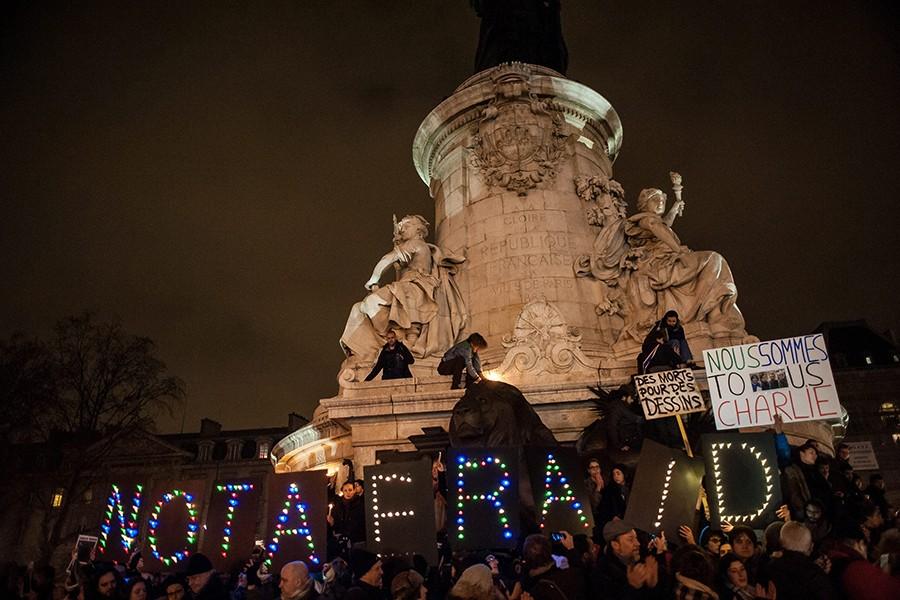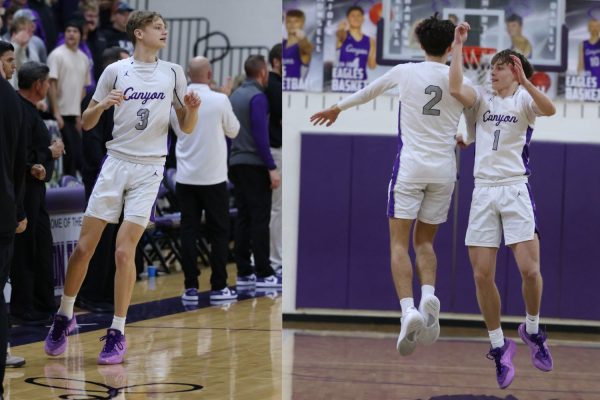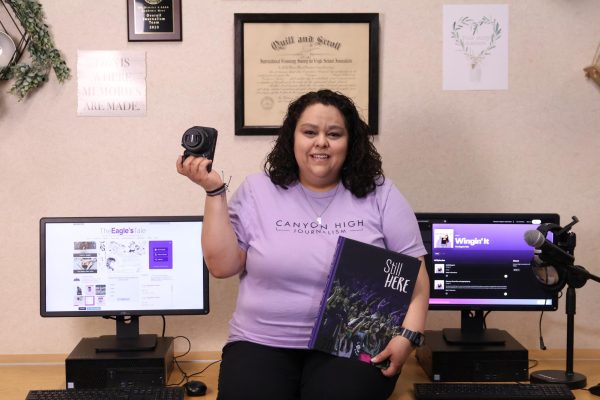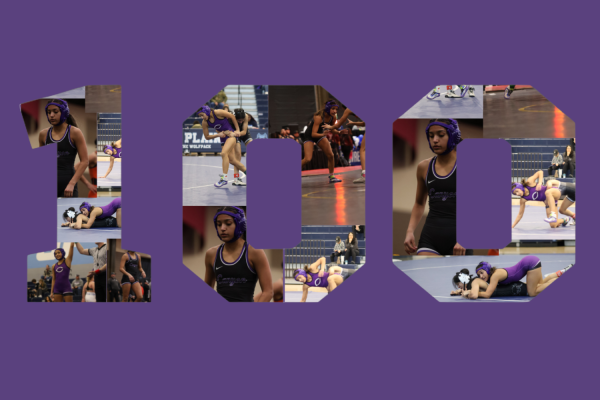Two elude police, more violence after Paris attack
People hold placards with LED lights displaying the message "not afraid" during a rally in support of Charlie Hebdo on the Place de la Republique in Paris on Wednesday, Jan. 7, 2015, after an attack at the headquarters of the satirical newspaper killed 12 people. (Julien Muguet/Maxppp/Zuma Press/TNS)
PARIS _ France mourned its dead Thursday amid a national sense of alarm as law enforcement authorities using a massive dragnet searched for two brothers suspected in the massacre of a dozen people at a Paris magazine.
As of early Friday, the two men had eluded a police hunt focused on several northern French towns where the fugitives were reportedly seen robbing a gas station and looking for a hide-out. Images on French television showed masked anti-terrorism police in full riot gear searching semirural homes as a helicopter hovered overhead.
Adding to the unease was news of another killing, a female police officer in a south Paris neighborhood. A man fatally shot her during a traffic incident and fled, authorities said. It was unclear whether the shooting was linked to Wednesday’s killings at the offices of the satirical weekly Charlie Hebdo.
Meanwhile, authorities reported two attacks on mosques that officials feared could set off a wave of retributory strikes in the country that has Europe’s largest Muslim community.
A day of national mourning was observed for the victims of the deadliest attack on home soil in decades. The vibrant heart of the French capital stilled as transportation halted, church bells fell silent and crowds gathered under gray clouds in a steady drizzle that matched the somber mood of a stunned nation.
In the evening, mourners crowded anew into the Place de la Republique in central Paris to remember the dead, occasionally breaking into chants of “Charlie n’est pas mort!” (Charlie is not dead!) and impromptu versions of “The Marseillaise,” the national anthem.
As thousands of people attended memorials, authorities hunted the brothers suspected of being the masked, black-clad men wielding assault rifles in Wednesday’s attack who systematically killed a dozen people. The victims were eight journalists, including the magazine’s chief editor, Stephane Charbonnier, two police officers, a maintenance worker and a visitor.
Police sought French citizens Said Kouachi, 34, and his brother Cherif, 32, in connection with the slayings.
U.S. intelligence officials believe that Said Kouachi trained in Yemen for a few months in 2011 with al-Qaida in the Arabian Peninsula, al-Qaida’s franchise organization there, according to a U.S. counter-terrorism official.
Indications are that the elder Kouachi returned to France shortly before Anwar Awlaki, the American-born cleric who directed the group’s outreach to Europeans and Americans, was killed by a U.S. airstrike in September 2011. U.S. intelligence officials believe Kouachi may have lost contact with his handler in the Qaida franchise after Awlaki was killed.
Awlaki’s death may have disrupted plans for Kouachi to launch an attack and could explain why Kouachi kept a low profile for several years before the deadly assault in Paris, the official said. The official spoke on condition of anonymity in discussing internal assessments.
Cherif Kouachi was arrested in 2005 by French authorities and convicted in 2008 of trying to help smuggle fighters to Iraq. The brothers were linked to a plot in 2010 to free an Algerian militant from jail but neither one was prosecuted in the case, the official said.
Based on information provided by French authorities, the two men were on the U.S. terrorism watch list, the Terrorist Identities Datamart Environment database maintained by the U.S. National Counterterrorism Center, the official said, and probably would have been prevented from boarding a flight to the United States, the official said.
French media reported Thursday that Cherif Kouachi was a failed rap musician who was featured in a 2005 television documentary on aspiring rappers, before drifting into crime.
While in prison, he befriended Djamel Beghal, who was serving a 10-year sentence for a plot to instigate an attack on the U.S. Embassy in Paris in 2001, according to Le Monde newspaper.
Authorities suspect that Wednesday’s killings may have been an act of Islamic terrorism against a publication known for its caricatures of public and historical figures, including the prophet Muhammad. Muslim leaders in France have condemned the killings.
Prime Minister Manuel Valls told France’s RTL radio that several people had been detained overnight in connection with the manhunt for the brothers. Their relationship to the brothers was not specified.
It remained unclear whether Wednesday’s attack, widely described as methodical and cold-blooded, was linked to any outside terrorist network.
A witness account in the French media quoted one of the attackers as saying, “You can tell the media that it’s al-Qaida in Yemen.” But there was no official confirmation that the incident was connected to al-Qaida or any other foreign group.
Early Thursday, two men matching the brothers’ description robbed a gas station in Villers-Cotterets, prompting a swarm of police and helicopters to descend on the small town 44 miles north of Paris. Special police units also searched nearby Crepy-en-Valois after reports surfaced that the suspects had taken refuge there after fleeing the gas station in a Renault Clio and heading in the direction of Paris.
In the south Paris district of Montrouge, the female police officer was shot to death while investigating a car accident.
Elsewhere in France, gun and grenade attacks were reported outside mosques in Le Mans, southwest of Paris, and in Villefranche-sur-Saone, near Lyon, prompting concern about an anti-Muslim backlash. No one was injured in either incident, police said. Authorities urged calm.
Meanwhile, in an act of defiance by the target of Wednesday’s slayings, Charlie Hebdo intends to publish 1 million copies of its Jan. 14 issue, or 17 times its normal press run, the magazine’s attorney, Richard Malka, told France Info radio.
Across Paris, mourners gathered to honor those killed.
“Whoever did this wanted to shut the mouth of free expression,” said Margy Adjouhgniope, 21, a university student who with her sister visited a makeshift shrine at the Place de la Republique.
The plaza, with its signature monument to liberty, fraternity and equality, has become a collective mourning ground. Handwritten signs in a multitude of languages proclaim: “I am Charlie.”
People added pens, pencils and scribbled notes to the mounds of flowers and candles, in a nod to the slain journalists’ craft. One person wrote: “Don’t kill anyone in the name of my religion.”
Another anonymous placard declared: “It is ink that should flow, not blood.”
At noon Thursday, during a moment of silence for the victims, those gathered in the plaza held hands as they circled the monument. Some had tears in their eyes. The observance silenced church bells, halted public transportation and darkened the Eiffel Tower.
“It was a very moving, solemn moment. It was about freedom of speech and how critical it is that voices be heard,” said Thomas Rutledge, an American chemistry professor visiting Paris.






